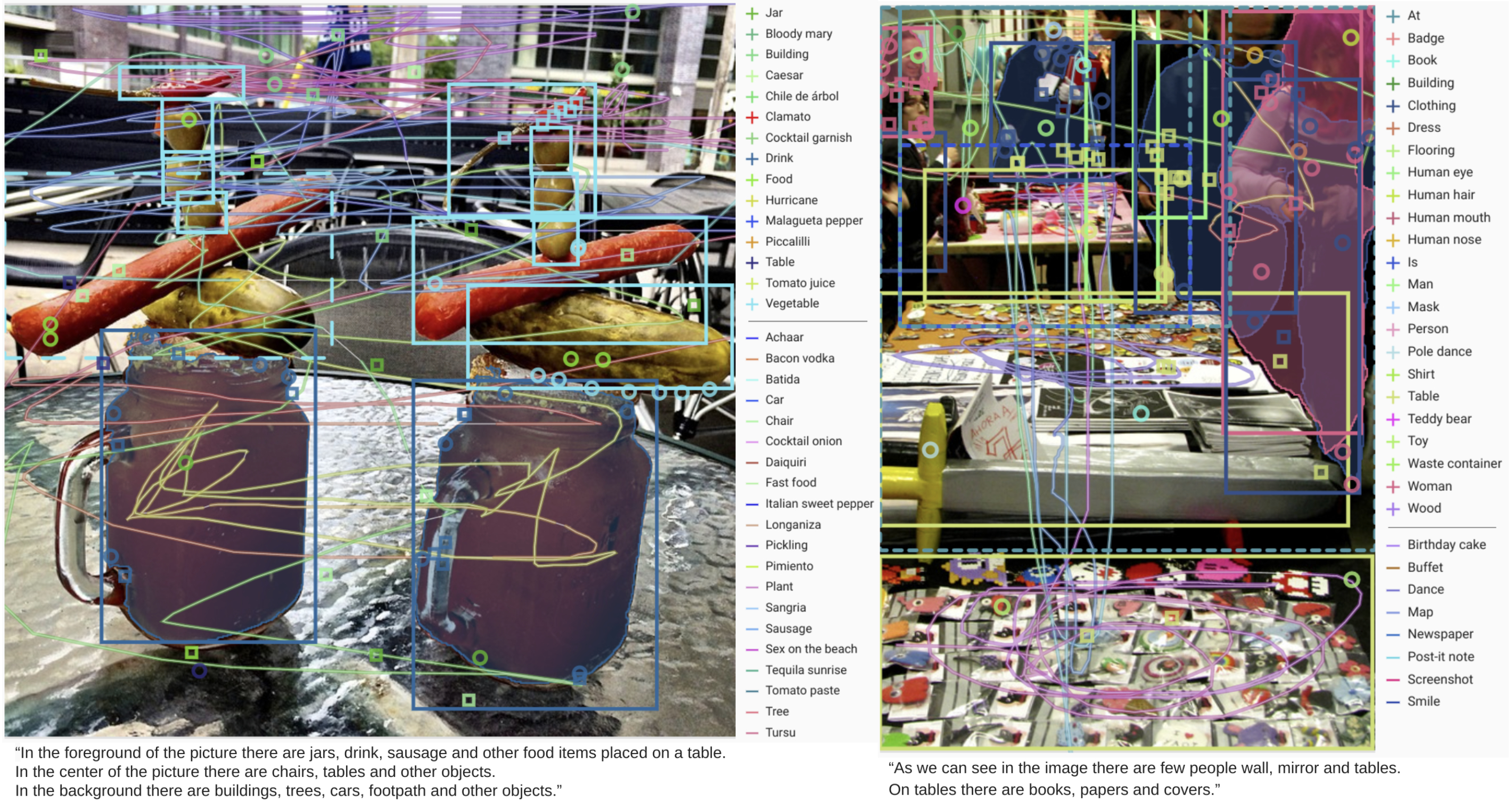Spaces:
Sleeping
Sleeping
| comments: true | |
| description: Dive into Google's Open Images V7, a comprehensive dataset offering a broad scope for computer vision research. Understand its usage with deep learning models. | |
| keywords: Open Images V7, object detection, segmentation masks, visual relationships, localized narratives, computer vision, deep learning, annotations, bounding boxes | |
| # Open Images V7 Dataset | |
| [Open Images V7](https://storage.googleapis.com/openimages/web/index.html) is a versatile and expansive dataset championed by Google. Aimed at propelling research in the realm of computer vision, it boasts a vast collection of images annotated with a plethora of data, including image-level labels, object bounding boxes, object segmentation masks, visual relationships, and localized narratives. | |
|  | |
| ## Key Features | |
| - Encompasses ~9M images annotated in various ways to suit multiple computer vision tasks. | |
| - Houses a staggering 16M bounding boxes across 600 object classes in 1.9M images. These boxes are primarily hand-drawn by experts ensuring high precision. | |
| - Visual relationship annotations totaling 3.3M are available, detailing 1,466 unique relationship triplets, object properties, and human activities. | |
| - V5 introduced segmentation masks for 2.8M objects across 350 classes. | |
| - V6 introduced 675k localized narratives that amalgamate voice, text, and mouse traces highlighting described objects. | |
| - V7 introduced 66.4M point-level labels on 1.4M images, spanning 5,827 classes. | |
| - Encompasses 61.4M image-level labels across a diverse set of 20,638 classes. | |
| - Provides a unified platform for image classification, object detection, relationship detection, instance segmentation, and multimodal image descriptions. | |
| ## Dataset Structure | |
| Open Images V7 is structured in multiple components catering to varied computer vision challenges: | |
| - **Images**: About 9 million images, often showcasing intricate scenes with an average of 8.3 objects per image. | |
| - **Bounding Boxes**: Over 16 million boxes that demarcate objects across 600 categories. | |
| - **Segmentation Masks**: These detail the exact boundary of 2.8M objects across 350 classes. | |
| - **Visual Relationships**: 3.3M annotations indicating object relationships, properties, and actions. | |
| - **Localized Narratives**: 675k descriptions combining voice, text, and mouse traces. | |
| - **Point-Level Labels**: 66.4M labels across 1.4M images, suitable for zero/few-shot semantic segmentation. | |
| ## Applications | |
| Open Images V7 is a cornerstone for training and evaluating state-of-the-art models in various computer vision tasks. The dataset's broad scope and high-quality annotations make it indispensable for researchers and developers specializing in computer vision. | |
| ## Dataset YAML | |
| Typically, datasets come with a YAML (Yet Another Markup Language) file that delineates the dataset's configuration. For the case of Open Images V7, a hypothetical `OpenImagesV7.yaml` might exist. For accurate paths and configurations, one should refer to the dataset's official repository or documentation. | |
| !!! example "OpenImagesV7.yaml" | |
| ```yaml | |
| --8<-- "ultralytics/cfg/datasets/open-images-v7.yaml" | |
| ``` | |
| ## Usage | |
| To train a YOLOv8n model on the Open Images V7 dataset for 100 epochs with an image size of 640, you can use the following code snippets. For a comprehensive list of available arguments, refer to the model [Training](../../modes/train.md) page. | |
| !!! warning | |
| The complete Open Images V7 dataset comprises 1,743,042 training images and 41,620 validation images, requiring approximately **561 GB of storage space** upon download. | |
| Executing the commands provided below will trigger an automatic download of the full dataset if it's not already present locally. Before running the below example it's crucial to: | |
| - Verify that your device has enough storage capacity. | |
| - Ensure a robust and speedy internet connection. | |
| !!! example "Train Example" | |
| === "Python" | |
| ```python | |
| from ultralytics import YOLO | |
| # Load a COCO-pretrained YOLOv8n model | |
| model = YOLO('yolov8n.pt') | |
| # Train the model on the Open Images V7 dataset | |
| results = model.train(data='open-images-v7.yaml', epochs=100, imgsz=640) | |
| ``` | |
| === "CLI" | |
| ```bash | |
| # Train a COCO-pretrained YOLOv8n model on the Open Images V7 dataset | |
| yolo detect train data=open-images-v7.yaml model=yolov8n.pt epochs=100 imgsz=640 | |
| ``` | |
| ## Sample Data and Annotations | |
| Illustrations of the dataset help provide insights into its richness: | |
|  | |
| - **Open Images V7**: This image exemplifies the depth and detail of annotations available, including bounding boxes, relationships, and segmentation masks. | |
| Researchers can gain invaluable insights into the array of computer vision challenges that the dataset addresses, from basic object detection to intricate relationship identification. | |
| ## Citations and Acknowledgments | |
| For those employing Open Images V7 in their work, it's prudent to cite the relevant papers and acknowledge the creators: | |
| !!! note "" | |
| === "BibTeX" | |
| ```bibtex | |
| @article{OpenImages, | |
| author = {Alina Kuznetsova and Hassan Rom and Neil Alldrin and Jasper Uijlings and Ivan Krasin and Jordi Pont-Tuset and Shahab Kamali and Stefan Popov and Matteo Malloci and Alexander Kolesnikov and Tom Duerig and Vittorio Ferrari}, | |
| title = {The Open Images Dataset V4: Unified image classification, object detection, and visual relationship detection at scale}, | |
| year = {2020}, | |
| journal = {IJCV} | |
| } | |
| ``` | |
| A heartfelt acknowledgment goes out to the Google AI team for creating and maintaining the Open Images V7 dataset. For a deep dive into the dataset and its offerings, navigate to the [official Open Images V7 website](https://storage.googleapis.com/openimages/web/index.html). | |